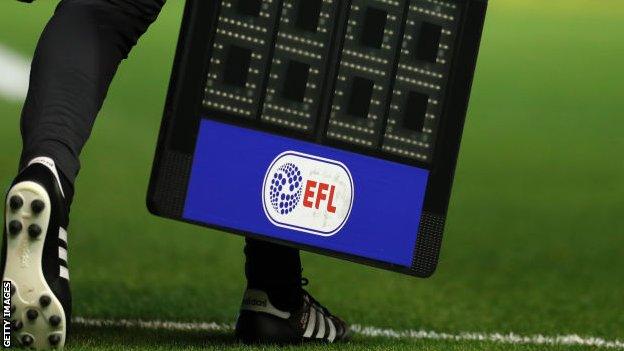
[ad_1]

The Premier League is still awaiting detailed proposals from the Football League relating to a requested £250m ‘bailout’.
The BBC was told earlier this month the EFL expected to be given details by the Premier League about what financial assistance it might offer for clubs to get through the coronavirus pandemic by the end of September.
This has become even more urgent given the government’s decision to end crowd pilots and block the return of fans to stadiums from the start of next month.
While the Premier League will continue advancing solidarity payments earlier than normal, BBC Sport understands that, while accepting the need for speed and to be flexible in their approach, league sources say they are not completely clear what the EFL is asking for beyond the headline sum.
There are those, for instance, who wonder whether Birmingham require additional funds to cover their costs given they sold midfielder Jude Bellingham to Borussia Dortmund for £30m in July.
In addition, it has been noted that some EFL clubs have been more proactive than others in cutting costs through reduced wages and squad sizes, and the Premier League does not want to be seen to punish those who have taken action themselves.
It is for this reason that BBC Sport has been told the Premier League needs detailed analysis of what money is needed, for whom and precisely why. Without this, the organisation is reluctant to hand over a cheque at a time when its clubs are feeling huge financial pressure given they are losing the most in terms of fans being absent from stadiums.
Respected football finance blogger Swiss Ramble posted on Thursday that the combined losses of Premier League clubs through the absence of matchday income would be at least £830m if no fans were allowed into stadiums for the remainder of the 2020-21 season.
That figure is regarded as a minimum as it does not take into account sums paid by fans buying merchandise on a matchday because that is calculated in a different revenue stream.
Manchester United stand to lose the most, an estimated £141m, with details about the impact on their finances due to be revealed in their end-of-year financial report, which has been pushed back to October.
EFL sources say detailed talks have taken place over a period of weeks but that it was impossible to go through the precise requirements of each club without knowing exactly what kind of funding would be available.
In addition, they suggest the sale of a player like Bellingham, or the £4m Exeter will receive as their part of the deal that saw former striker Ollie Watkins join Aston Villa from Brentford earlier this month, are long-term financing rather than the day-to-day running of a club, which gate receipts obviously are.


[ad_2]
Source link